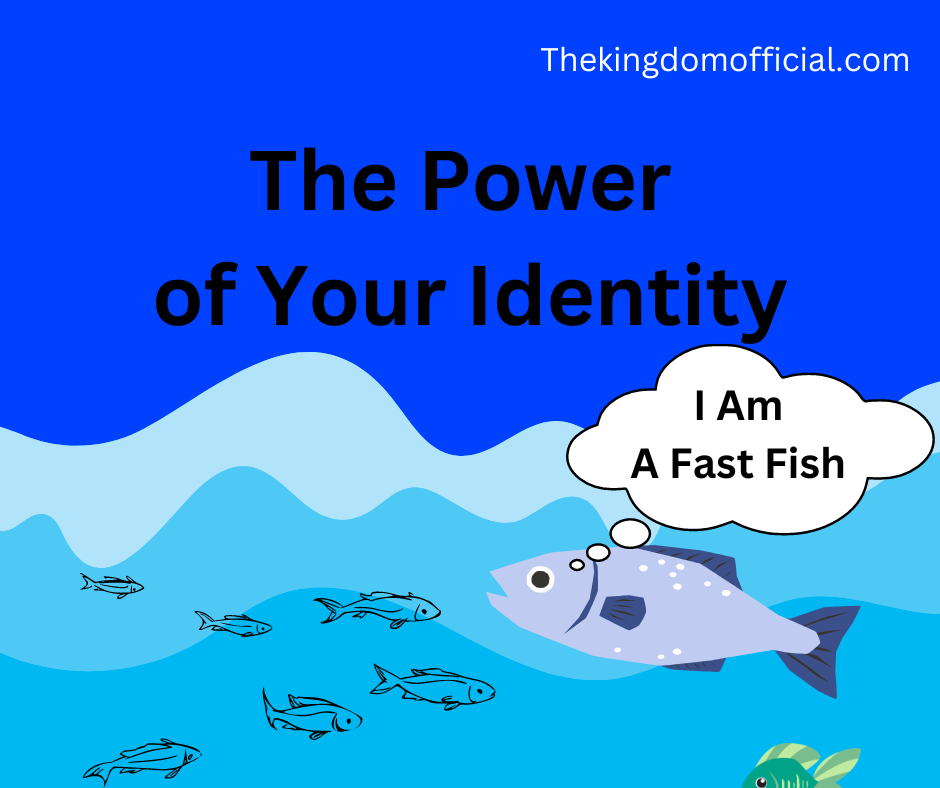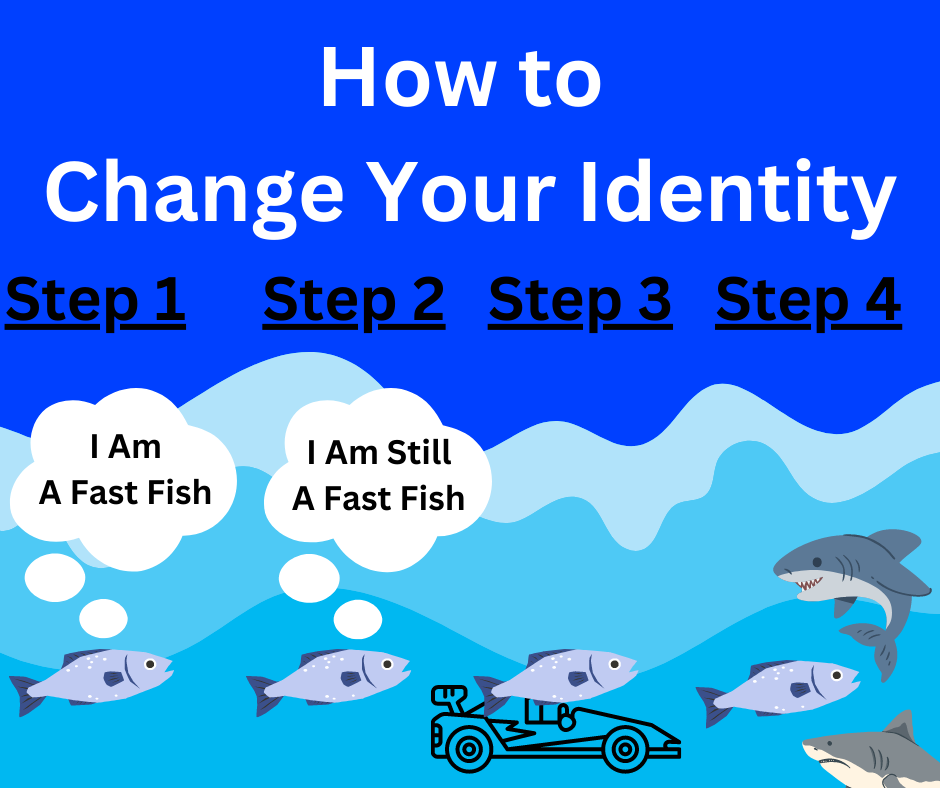The Power of Your identity
There is an ongoing debate where people are arguing about discipline and motivation. Everyone wants to know which is better. They want to know which is more powerful. If you found the answer, you would hold the power to change your life for the better, wouldn’t you? Some big name YouTubers have even built their entire brand around this argument, usually by taking one side to the extreme. Some movements have adopted one side or the other as part of it’s movement. However, what’s the truth? What is reality? Well, to get to the bottom of it, we need to recognize that there are 2 other contenders that have been left out of the argument: Habits and Identity. Let’s discuss each one of these in more detail to discover which one really wins the argument. Spoiler alert! The power of your identity is by far the strongest force to recon with, but let’s find out why.
Time Differentiation
Let me lay out how this all works real quick. Discipline and motivation are short term tools. Habits are a medium length tool, and your identity is a long term tool. Now does it make sense why the power of your identity wins over all the others?
Think about it, use your logic from previous life experiences. Have you ever continued to do something because you were motivated? Eventually, motivation will fade. However, the exact same thing will happen with discipline. What happens when your discipline needs discipline? Usually, you just give up. You give up, until you can get enough motivation to try again. This is why so many people start and stop going to the gym. They get motivated to go, then they lose motivation. They use their discipline to keep going, then eventually they give up. Why? Because motivation and discipline are not designed to be a long term solution to the problem.
Yet, there are things that you do automatically without thinking. You do these things every day without noticing. For example, You see someone and smile because you’re a kind person. You wash your hands because you’re a clean person. You show up late to work because you’re a late person. Whatever you associate your identity with, you do. You have to do these things. Someone cannot believe they are something as part of their identity and not do it. This would break the rule of consistency and cause massive Cognitive Dissonance. As long as someone associates something to their identity, they will struggle not to do it for the rest of their lives. We see this in people that associate themselves with the identity of being a smoker. Once they take that idea as part of their identity, they will always struggle to quit. This is the power of your identity.
Motivation
The first thing we should discuss is motivation. Why? Because Motivation is usually the first tool we have and the first tool we use. No one will even consider employing discipline unless there was motivation first. What is motivation? I don’t think we need to get into a deep discussion on semantics, so a simple definition will do. Motivation is simply a desire to do something. If you have ever wanted to do something, you have felt motivation.
The thing is, we are emotional creatures. This means that motivation is extremely powerful. No one can deny how powerful motivation is. If you have motivation to do something, it usually happens easily.
The problem is when motivation dissolves. To a certain extent, motivation can be manipulated. Everything we see, hear, and think influences us. So if you want to do something and you’re lacking motivation you can use this knowledge to overcome that lack of motivation. Watch a video, read a book or magazine, or think about something pleasurable associated with it and you will likely become motivated to do it.
With that being said, motivation is still a short term tool. It comes and goes. It’s primary goal is to help us reach the point where the activity becomes a habit. However, since motivation comes and goes, it needs some help from the other short term tool: discipline.
Discipline
Discipline is the other short term tool. What is discipline? Once again, a simple definition is forcing ourselves to do something we do not want to do. Discipline is actually very weak. Why? Because you’re fighting against your natural desire. Discipline is a lot like swimming against the current. Is it possible to swim against a current? Yes, if the current is not too strong. However, doing this will wear you out over time. Discipline is a struggle and goes against what we want. Naturally, discipline will eventually give out. This is why balancing discipline with motivation is important. You need both of these tools to make it through the beginning until something becomes a habit.
Habits
What is a habit? In simple terms, it’s an action that has become part of your daily routine that doesn’t require much thought and there is not much resistance. For example, you tie your shoes and brush your teeth every day. Do you need to feel motivated or use discipline to do these things? It’s simply part of a routine and you just do it. Once something becomes a habit, there is little struggle to continue it. Now, motivation will still pop up and sometimes you will still use discipline to keep the habit in place. However, discipline and motivation become a supporting role to a habit rather than the only thing keeping it going.
The thing is, habits can last a life-time and never become part of your identity. Do you consider yourself a “shoe tying person”? Of course not. You keep it part of your routine because you understand that it must be done, but it’s not “you”. On the flip side, habits are not part of your identity. So if your routine changes, which it often does, you risk losing the habit. This is why some people create amazing habits of exercising while they are young, then they get a promotion or a new job and eventually their gym time decreases until it’s non-existent. Exercise was part of their routine and they developed that habit, but being an athlete never became part of their identity. Habits are a great place to be. The issue that was mentioned is that habits can be lost. This is the power of identity, it cannot be lost.
The Power of Identity
What is identity? This is something that you have developed a strong association with the idea of who you are as a person. What is Identity? It’s your beliefs about yourself. It can be understood as the “I Am” statements that you tell yourself and others. They can be positive or negative.
- I am funny.
- I am smart.
- I am an athlete.
- I am nice.
- I am ethical.
- I am cute.
- I am a man.
Once something reaches this level, it literally is who you are. You cannot act against this statement without it causing cognitive dissonance. If your routine changes, you will be certain to include these things into your new routine because it’s just who you are. What is identity? It’s you. It’s a step beyond habits because habits can change quickly and your identity is much more permanent. This is the power of your identity, it’s strongly ingrained into your life.
Identity Does Change
Your identity does change, just not quickly. This is why you need motivation, discipline, and habits to maintain something for a long enough period of time for it to become part of your identity. Although it takes time, identity can change.
This is powerful knowledge. Earlier I stated that your “I am” statements can be positive or negative. You can change your negative “I am” statement and make them positive. It just takes effort and time to do this. I assume that if you are reading this article, you have a desire to make your life better. To make your life better, you will want to replace your weak “I am” statements with strong “I am” statements. You want to develop a powerful identity and not a weak one.
No one is born with a strong and empowering identity, it’s something that is developed. You will need to change your identity to empower yourself rather than let your identity destroy you. This is the power of your identity. It really can make or break you. So, how do you change your identity?
Changing Your Identity
Now that we have discussed the question, “what is identity”, now we need to discuss how to create a new identity and how to change your identity. Now, I am not talking about being a spy and creating a new alias and pretending to be someone you’re not. We are discussing how to actually change who you are. So, let’s discuss how to create a new identity.
Step 1
You need to develop a new concept that you would like to make part of your identity. For example, lets say that you want to make exercise part of your life for the rest of your life. You need to define this as your goal. You can then create some phrases to teach your mind. Maybe the phrase “I am an athlete” or “I am a bodybuilder”. If you cannot identify what you would like to add or change about your identity, you will struggle to change your identity.
Step 2
Consistency, repetition, and time. You must be consistent over a long period of time or your identity will not change. You must repeat the idea over and over again. Then you must repeat it daily, weekly, monthly, for the rest of your life. Then finally, you must give yourself a long period of time for things to begin changing.
Step 3
Begin acting and developing the mindset and skills that your new identity would have. You must convince yourself through action that what you are telling yourself is true. Saying it alone may not be enough. If you want to make exercise part of your identity, you must commit to doing daily exercise, even if it’s a small amount. You must learn the skills and knowledge that an athlete or bodybuilder would know. You need to build the mindset of an athlete or bodybuilder. Without putting in the action, you will develop new thought habits, but like we said, we want to know how to create a new identity.
Step 4
Create a social circle of people that identify with the thing you identify as. If you’re alone, it will be more difficult to change your identity than it will be with a bunch of other people. There is a common phrase that goes, “Show me your 5 closest friends and I’ll show you your future.” I believe it was said by Jim Rohn. This phrase applies to this concept.
Settle The Debate
As you can clearly see, the argument about discipline vs motivation is kind of silly. We need both of these to make more powerful connections such as habits and to change our identity. As you have also learned, as we move up, it takes longer to develop. For example, habits take longer to develop than motivation, yet developing your identity takes longer than creating habits. However, this does not mean that your identity cannot be changed. In fact it can and should be. You should develop your identity into something that empowers you. So, in this article you have learned all about the power of your identity, what is identity, and how to change your identity. We have also discussed how everything works together and nothing is better than anything else.
Video
Resources
Get Connected
-
- If you have enjoyed this article, you can get alerted to new articles and exclusive information by joining our email list. You can access this through the pop up on our home page. (You’ll also get a bunch of free stuff.)
- If you would like to keep learning, check out more of our articles!


